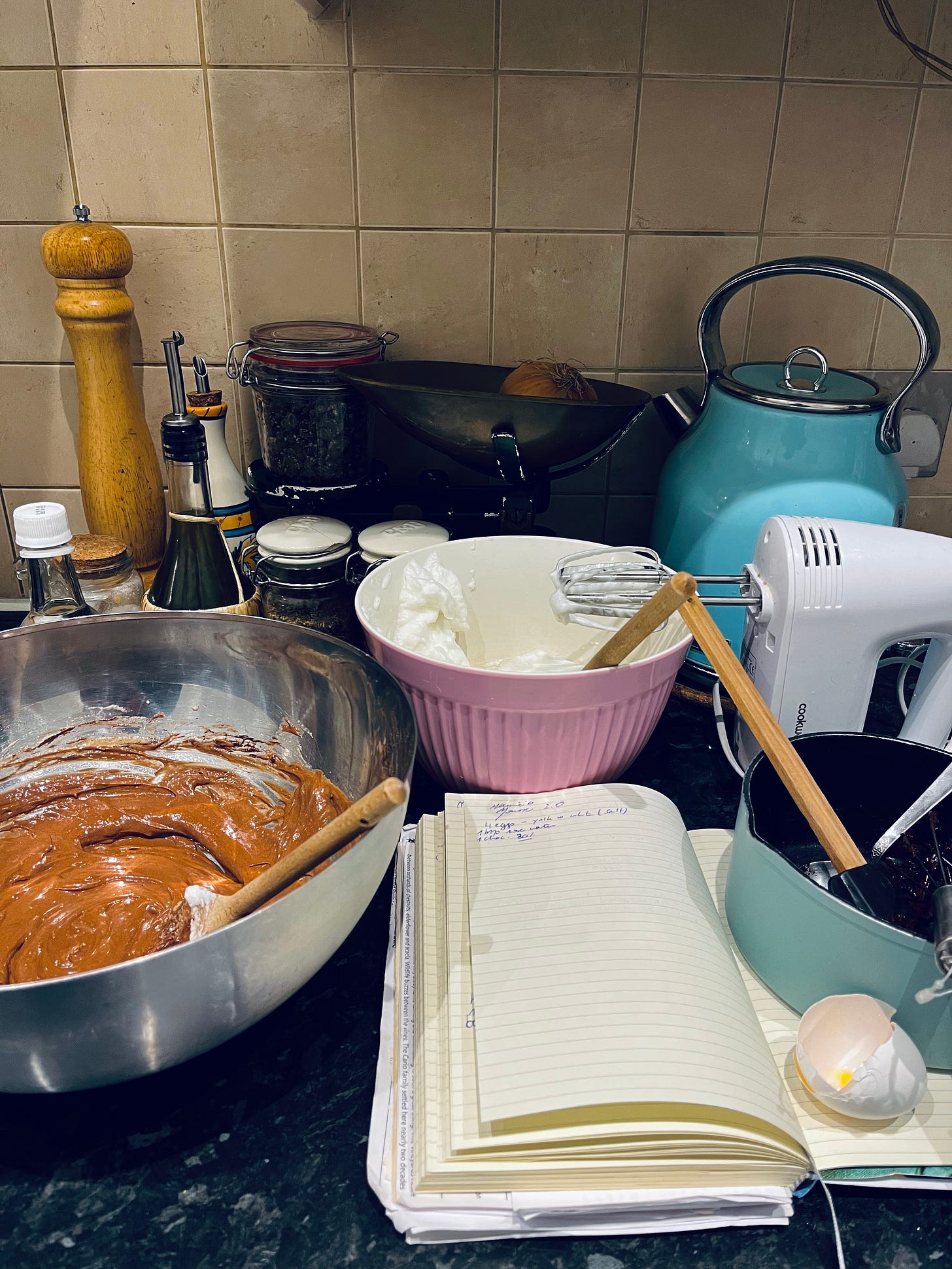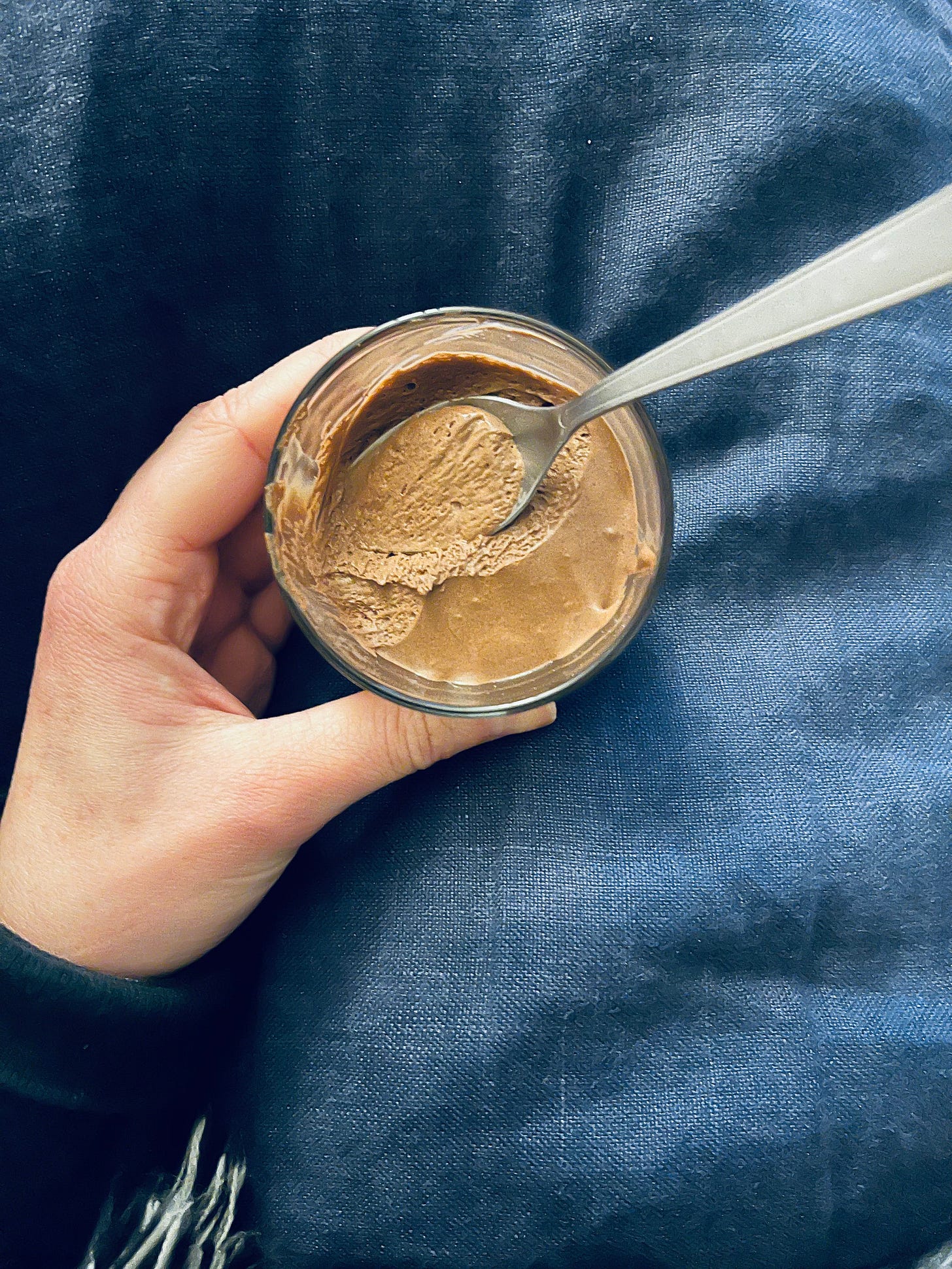Autumn: Bodies in Flux
talking about the word obsolete with my mother and grandmother; chocolate mousse to scoop
Obsolete adj no longer in use; out of date. obsolescent adj becoming obsolete. obsolescence n. – Collins English Dictionary & Thesaurus
I walk to the botanic garden, snacking an overly ripe fig and brown leaves crunching under my feet – I think about the word obsolete. My phone updates and restarts one step closer to obsolescence. A fragility fracture, running out of meds with an expired prescription and into joint pains – I feel like I’m becoming obsolete.
Last week was World Menopause Day. I didn’t know about it until I caught a radio show during which women called in to share some of their experiences with accessing health advice and treatments: discredited period pains that led to an emergency hysterectomy, disregarded menopause symptoms because ‘this too shall pass’, period poverty and overall taboos around the subjects of menstruation and menopause, the fear of being jeopardised at work and in society. It was only a few months ago when a radiologist told me, matter of fact, ‘remember that the MRI machine was designed for men. It’ll be spacious for you.’ He smiled brightly – reassurance was his intention, I suppose – and so I smiled back, yet the realisation shivered down my spine. This week, I’m lucky to have my mum in Glasgow with me. Together we walked up to the necropolis; it was drizzling, we twitched, and we talked about grief and bodies and different forms of retirement. I won’t go into the details of our mother-daughter conversation here, but we discussed how fertility is the lens through which a woman’s body and morals are judged. My mother reminded me, and maybe herself, that nobody wants to feel obsolete themselves, or see what they made become obsolete.
The French word for obsolete is ‘obsolète’. Same word but with the addition of one accent – è – which is called ‘grave’ in French, so said to be severe. Obsolète. adjectif. latin obsoletus, négligé, usé. A linguistic gear shift from the passive to the active voice unravelled between us as we walked through the greying Victorian cemetery; I heard her say ‘you neglected it therefore it became obsolete.’ Linguistics, like history, is shared but language, a body experience, is subjective.
We walked for the rest of the day with my mother, talking. I love how we always act as if we’re the only two people who speak French when she visits me in the UK, walking around and allowing ourselves to say indiscreet things out loud, even louder this time with our ears tucked underneath hats. We kept walking like two shouty French women, navigating our relationship with medications and the choices we’re making, or not making, and as I scanned our surroundings, still uncertain about my ways around Glasgow, I couldn’t not see her…
…Autumn.
The umber palette, moody and generous; rainy, the promise of a rainbow, yet unpredictable. An autumnal walk perks with the sight of a mushroom and the possibility of it being either nutritious or poisonous; the kitchen is creamy. Autumn is the season against obsolescence; in Scotland, the hedgehogs and the dormouse will hibernate while swans and geese migrate back towards the British shores. Across the northern hemisphere, animals will grow fur and stock food; the soil draws in moisture, ahead of winter and in preparation of a springtime bloom. The word season – ‘une saison’ – is female in French. I think about autumn as a woman’s body, in flux, plural. Windy and humid: autumn is the season I feel inside my thinning bones.
I didn’t tell this to my solution-driven mother, who I know would have responded something along the lines of: ‘Le printemps c’est bien aussi.’ Spring is fine too.
There is no looking at my mother without seeing my grandmother.
I can remember my grandmother living in three different flats. The first one solely through unreliable colour flashes – a green sofa, an orange timer in the kitchen – and the latter two more distinctively. I spent all my Wednesday afternoons, when French pupils are off school, learning my tenses on the round table in the living room of the second one. I hid underneath it often too, away from the intricacies of the subjunctive tense. My grandmother moved home while I was living aboard so I never visited that flat while being aware it’d be the last time. But Paulette is a keeper so, in a certain way, I always return to her place instead of a flat. The last time I visited France, I still found the objects that keep us close. She has this penholder lined with a faux-fur material so she can store her glasses safely in it too; I’m obsessed with it. I let her know, and Paulette said, seriously: ‘I don’t let anything become obsolete’.
I heard the word obsolete, or, in fact, I had heard the word obsolete before my mother said it earlier this week.
The word, its implications, have stayed with me. I’ve been thinking about my grandmother’s relationship with materiality and with time; how she reuses, and I recycle; how she has never once told me she is in pain, but I know she has hurt and that she will hurt again. How this delay between her experience and mine has shaped how we describe the world around us and how we navigate it together; how we have come to accept things I swear we wouldn’t let happen again if it were to happen again. Yet I can’t say truthfully that we wouldn’t. I think that there is nothing obsolete about my mum or my grandmother or me, or you, unless we let it be forgotten. I often talk about time here – like about delaying and the concept of ‘différance’ or more recently in Soups, No Timer – and this newsletter is, in a way, part of a thinking in-progress; a wish for memory, to step away from reading history as a linear timeline, but to record it through the lens of human’s responsibilities.
With human doings also come great things, and Paulette makes the best mousse au chocolat. She handed me her recipe for chocolate mousse in the form of a paper cut-out, which I glued inside my recipe notebook. I couldn’t help but to add some rose water to my version of the mousse, a twist to match my taste, because taste is in flux. Recipe for four chocolate mousse portions:
4 eggs, yolk and whites separated
100g dark chocolate, 80%
1 tbsp rose water
1 pinch of salt
Over a low heat, melt the chocolate. In a steel bowl, beat the egg whites and a pinch of salt until you’ll reach a stiff peak. In a large, separate bowl, mix the chocolate and the yolks. Add a tablespoon of rose water. With a wooden spoon, fold the egg whites into the chocolate preparation, gently rotating from bottom to top. Pour the mixture into four serving bowls, close the top by placing a wooden board on top, or using cling film, and chill the mousses in the fridge for at least three hours.
My mum would have been right, you know, spring is good too. The thing is, when a new season starts, it doesn’t make the previous one obsolete – this is nature’s nurturing – and so my body works in conversations with the humans in my life and the land I live in.
I walk out, down the road and into the park; again, but alone. I pick a red leaf on the ground, uprooting, walking back home. I place the leaf between the pages of a book, shelving it away; flexing time like a body muscle, rooting.
Margaux
To publish, especially at this present time, can’t be done without acknowledging the world in which we write and read – its wars and pains and its grief – so if you’ve the means, please consider donating to Medical Aid for Palestinians. MAP is on the ground in Gaza, stocking hospitals with essential drugs, disposables, and other healthcare supplies. You can read more about what the organisation does for women’s and children’s health here.
This month on TOP I also shared some exciting news about my second novel, Breaststrokes. You can read more about it here and pre-order a copy here.
Thanks for being here with me. This newsletter comes out every other Thursday, and you can give it some love by subscribing below or forwarding it to a friend.
Another way to support my work is to buy a copy of my novels via The Onion Papers affiliated bookshop. <3








